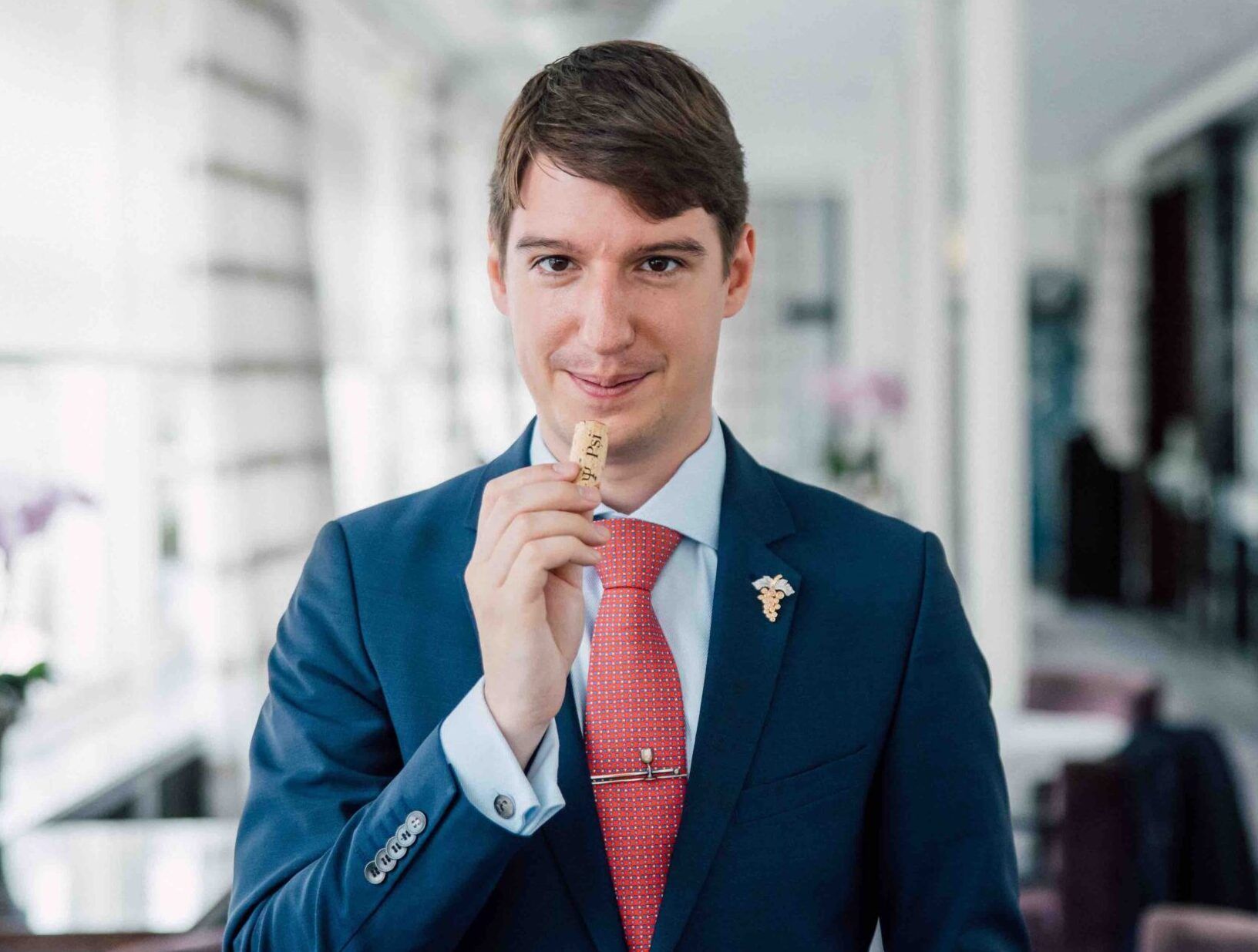“If you had told me three years ago I would be learning how to make popcorn I wouldn’t have believed you,” says Marc Almert.
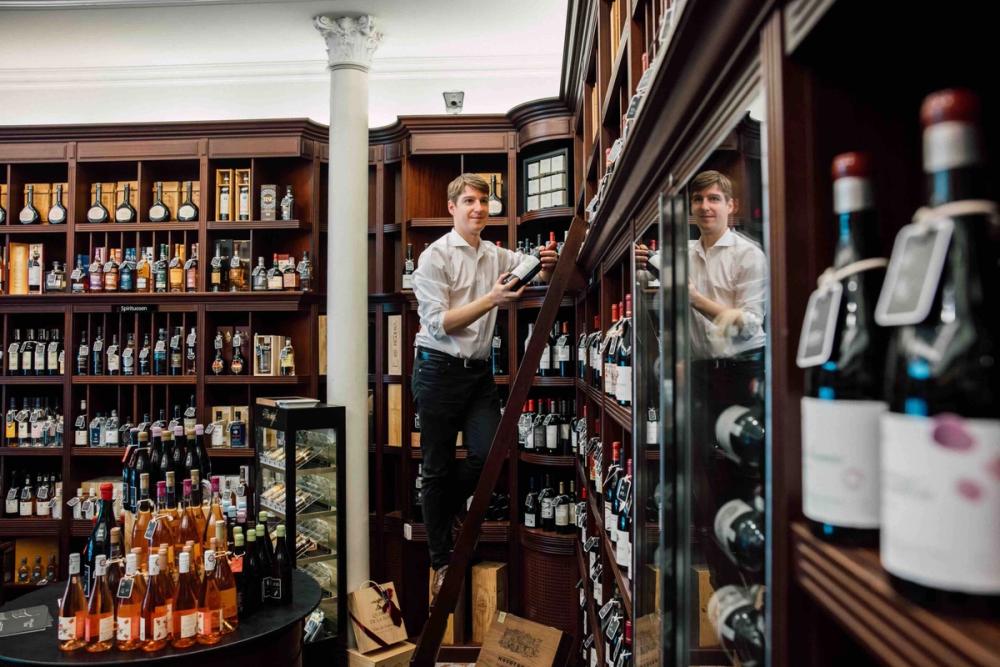
Covid meant that Marc Almert could start cutting his teeth working in off-trade
Being a native German, Marc Almert is no stranger to winning a World Cup or two. What makes it even more galling (particularly to us Brits) is that Almert, the reigning best sommelier in the world, didn’t actually put his name forward to compete in his first major competition, and yet he still won.
Almert was 27 when he won the Best Sommelier of the World title from the Association de la Sommellerie Internationale (ASI) in March 2019, which made him one of the youngest ever to win this prestigious award. In normal times he would have already passed on his crown to a newcomer but, because of Covid and the cancellation of some of the competitions leading up to the final, Almert gets to be the world’s best sommelier for four years instead of the customary three, with the next final being in February 2023 and not 2022 as originally planned.
For the past five years he has been working at Zurich’s world famous Baur au Lac, where he is Chief Sommelier, a role that includes working in two-Michelin-starred Restaurant Pavillon, Baur’s Brasserie and the Le Hall, the 5-star hotel’s crown jewel. But just one year after his triumph, beating off 66 sommeliers from 63 different countries over the course of a week and then winning the most gruelling of finals, Covid struck taking away his opportunity to travel the world – one of the key motivators for taking part in the competition in the first place.
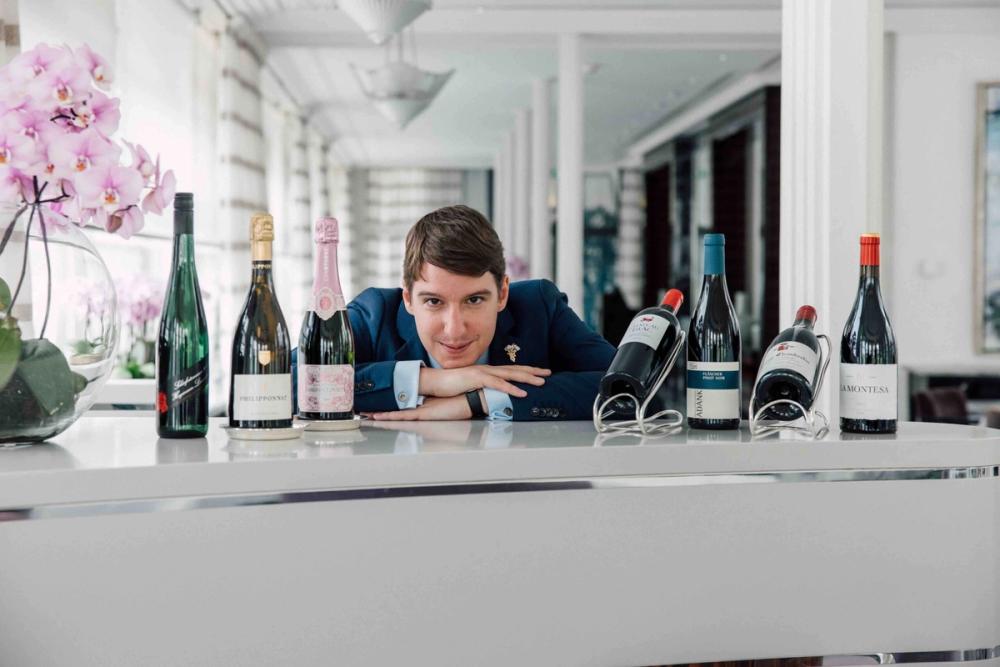
Marc Almert now has his own 16-wine collection sold online and through Baur au Lac’s retail outlets
How Covid affected the world’s best sommelier
The global pandemic has had a devastating effect on the premium on-trade, so what was Almert’s experience?
“Switzerland is not as liberal as the UK or Sweden (regarding the easing of lockdowns) but more liberal than the rest of Europe so we didn’t have to shut the hotel; there were periods when there were just five or six guests but we still kept it open. Like everyone else we started a delivery service and takeout and all that, but the nice thing for me is that the family that owns the hotel also owns a couple of wines shops and a wine distribution company – so I was never really out of work.”
And so the king of on-trade cut his teeth on working off-trade. Baur au Lac has its own wine shop both in the hotel, online and at four locations around Zurich, it also has a distribution set-up for the Swiss catering industry and speciality shops. Apart from a buying and ambassador role, Almert was given the opportunity to create his own personal wine selection – a rotating 16-wine portfolio called the Marc Almert Selection, which is sold through these Baur au Lac Vins outlets. (The current list can be accessed here.)
Life at the hotel also had to get creative.
“Weddings and art exhibitions (which we normally did) was impossible so when we did do something we were creative about it – we set up an open-air cinema with a small bar which was a real success. And we would theme the cocktails accordingly – Vesper with a James Bond film or Dry Martini and a small selection of wines that would go with the popcorn or ice cream – a nice experience – but if you had told me three years ago I would be learning how to make popcorn I wouldn’t have believed you.”
Almert also used this time to work more closely with the International Association of Sommeliers launching content such as video tutorials, and he also started using social media which he had never done before.
So how did Covid affect Baur au Lac’s wine portfolio?
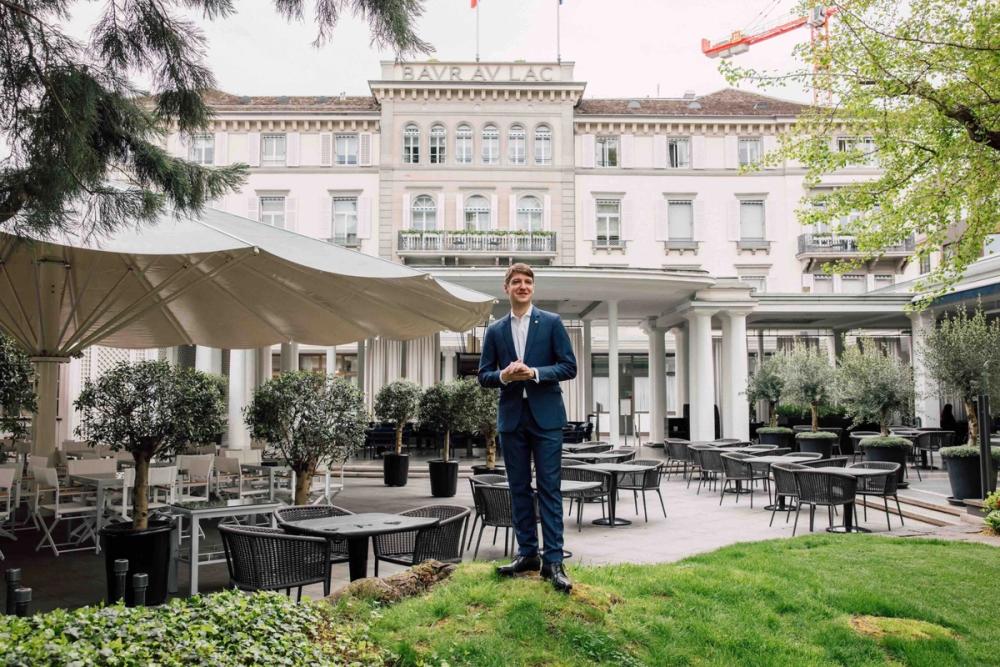
Marc Almert outside Zurich’s five star hotel Baur au Lac where he is chief sommelier
“The wines that didn’t really move much were the slightly more entry level wines that we normally use for big scale events because those events weren’t happening. But more and more customers started asking for the higher price point wines – they were enjoying wine at home and the average bottle price went up. It will be interesting to see if that is something that is here to stay or whether it was just a Covid effect, I feel it is here to stay.”
Almert says is still witnessing people spending more when they go out and in bigger groups.
“People are so happy to be able to go out now that when they go out they go out to the max and are often in a bigger group so it’s a nice development,” he says.
In addition to his responsibilities at work, for the past three years Almert has been working with three different sommelier associations – the German association where he is one of the vice presidents, the local Swiss Association which he is is an honorary ambassador for, and the ASI where he sits on their education committee.
And how can he cope with this workload?
“Good time management,” he smiles.
Sommeliers’ need to compete
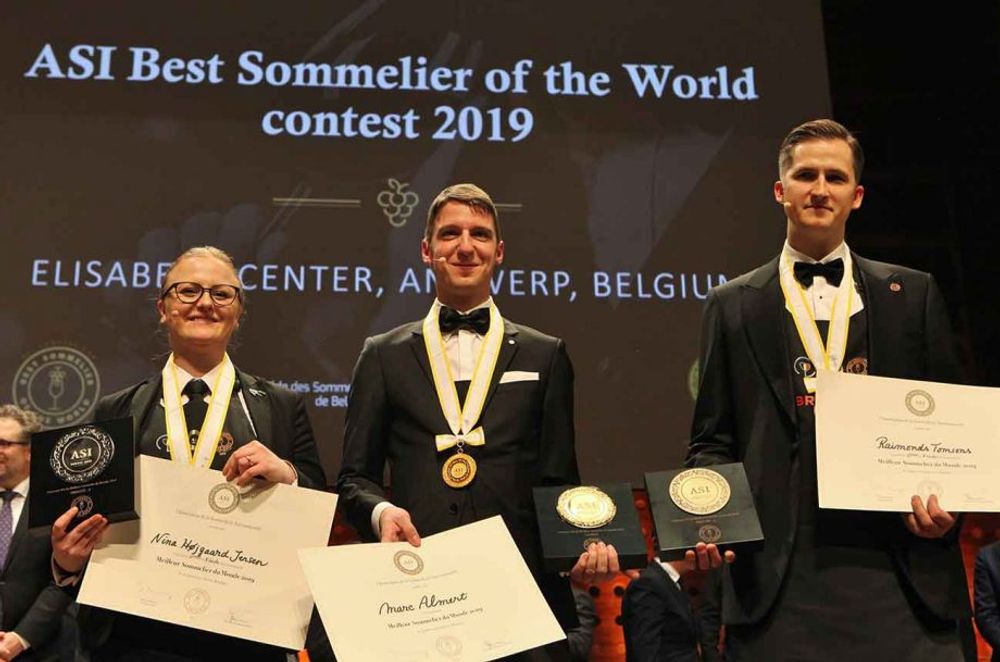
Marc Almert at the awards ceremony for world’s best sommelier, 2019
Almert is a huge advocate of sommeliers taking part in competitions, for the learning that takes place in the preparation but also for giving you a global perspective.
“To me it was one of the greatest experiences because it enabled me to travel very early and also meet a lot of people from around the world and some of those contacts have stayed with me until today – colleagues from different environments, different countries – some work in restaurants, some work in hotels some work in off-trade, and it’s good to get thoughts and opinions on what is more or less the same job. Whether we are in Zurich, Kuala Lumpur or Cape Town we are all pulling corks and serving guests… but it is also very different, and that is the most enriching thing.”
His advice to young budding sommeliers?
“Do every competition you can because sometimes they are focused on one region, sometimes they are young sommelier competitions, sometimes they are a big one like the one recently in the UK, but every time you compete you make new contacts. In the best case you can win something be it a trip or a masterclass, a nice bottle of wine but just in the process of preparing for it you are learning something or tasting something in a much more focused way than if you hadn’t taken part.”
“And I think competing should always go parallel with wine education – it should not replace it – if you do both it will help you grow as a sommelier… more experiences more ideas.”
Which qualifications to go for depends upon what part of your life you are in and the nature of your work, Almert believes, “If you are working off-trade probably the WSET makes more sense, if you are working on-trade and you are someone who can structure themselves and be disciplined then the Court of Master Sommeliers makes sense. Look at local possibilities such as the ASI diploma too.”
Fitting studies in while working full-time has obvious challenges so it is key that you get your employer on board, Almert says.
“I was working full-time when I studied for the best sommelier in the world, I didn’t take much time off but my employers did help especially with being flexible in terms of scheduling, and it probably helped that my predecessor is Aurélien Blanc who was originally from Burgundy and he won the best sommelier of Switzerland in 2018. When I’m not there he is – I also got support from family, friends and the National Sommelier Association who provided me with travel.”
“The key thing is to travel, you get more and more international contacts it’s the nicest, most rewarding thing about the whole project.”
Any negatives about having won the best somms crown?
“I never did the competitions to win the competitions I did them to improve as a sommelier (it was a big surprise to win) so one negative is that I don’t compete any more because I really like to compete, so I miss that. But if you want to work you can’t do everything… we all marveled at Gérard (Basset), Gérard was a unique idol – I don’t think we’ll see another person again with all these titles.”
VieVinum and Austrian wine

Marc Almert, VieVinum, May 2022
Almert and I are catching up at Austrian Wine fair VieVinum, the fifth show he has attended this year and one of the most important – Switzerland is the second most valuable market for Austrian wine.
Almert says that the Swiss have acquired a taste for Austrian wine through travel, particularly skiing holidays, but there is something about the Austrian white wines that also sits better with the Swiss palate.
“It works well with the Grüner Veltliner because the Swiss palate is not so keen on acidity and Grüner compared to Riesling has a little bit less acidity. And we’re seeing more red wines coming in, also sparkling wines especially the Sekt – this is a huge trend we look forward to embracing.”
Almert doesn’t see Austrian and German Sekt as competing with one another as they both produce excellent quality, however with different terroirs and different focus grapes – Austria often uses its indigenous Grüner Veltliner and Zweigelt, whereas many German sparklers are based on Riesling, Pinot Blanc and occasionally even Traminer. “Both countries are very dynamic and both are developing new models on how to classify their sector and that is a great step ahead,” he says.
“Compared to many international sparkling wines notably Champagne and (sadly) also English sparkling wine both Austrian and German Sekt are a better price point in terms of value – so in a restaurant it’s easier to put them in a by-the-glass programme or be part of a food-tasting flight.”
So what other tips does Almert have for sommeliers when it comes to Austrian wine?
For one, it is the growing importance of wines that use indigenous grapes, particularly important with the still wines – Rotgipfler and Zierfandler for example. “Red, sparkling, organics are all growing, and grapes that used to be drunk locally you are finding now on international wine lists like Gruner Veltliner, Zierfandler and some St Laurent.”
Zweigelt needs its own mention… “I think anyone who enjoys high quality Beaujolais will enjoy high quality Zweigelt. Because it doesn’t have that much tannin – it’s great for a less serious wine approach – but there are more and more serious Zweigelt being made especially from single vineyards in Carnuntum… it will be really interesting to see how they develop.”
But it is Blaufrankish that he believes is the most important Austrian red for international sommeliers.
“Blaufrankish would be the highest quality red wine grape in Austria, they also make some great international blends of course, some great Pinots but for the international market Blaufrankish is the one to look out for. More and more producers are moving towards a leaner, more elegant style, with less extract, less oak and less alcohol so we will be seeing more of that and I think if you have food it’s good, it’s definitely food wine.”
In terms of Austria’s wine regions, Almert thinks that the Weinviertel in Lower Austria is one to keep an eye on. “Weinviertel is quite dynamic at the moment – more and more winemakers are concentrating on the quality pyramid which is a great approach.”
Almert is visiting the seven or eight Austrian wineries at the fair that he currently works with, as well as tasting some of the 600-plus producers showing at this year’s revived VieVinum. He believes the wine scene here is exciting because younger winemakers are working alongside more established ‘old school’ family estates and helping them to change their style.
“It’s good to see the young wild guns coming along next to the very established which goes hand-in-hand with the next generation taking over and changing the style – more lean, less alcohol much more minerality-driven so that can happen in an established family estate. And when you have established wineries experimenting it shows that, even in such a traditional region like the Wachau, a cooperative like Domaine Wachau, for example, can be pushing the envelope. It shows the real dynamics of the wine scene here.”
Peter Dean was talking to Marc Almert at VieVinum 2022, which is run by Austrian Wine. Austrian Wine is a supplier partner of The Buyer, to discover more about them click here.
